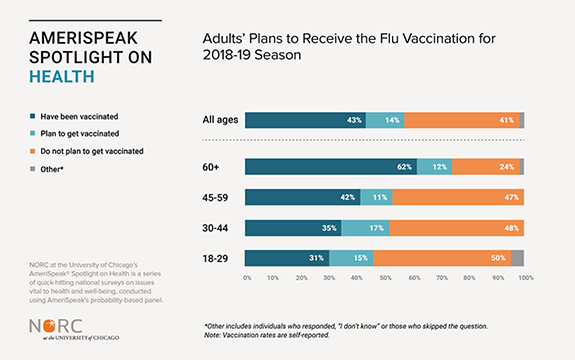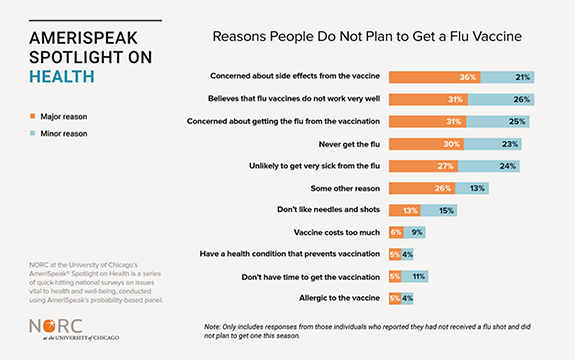41 Percent of Americans Do Not Intend to Get a Flu Shot this Season
Top reasons cited were not expecting to get the flu, lack of confidence in efficacy of vaccine, and concern about side effects from the vaccine.
CHICAGO, Dec. 5, 2018 — Despite repeated warnings about the potential dangers of the flu, a new survey from NORC at the University of Chicago finds that more than half of all Americans have yet to get the flu shot, and few intend to do so.
As of mid-November, 43 percent of adults reported that they had gotten a flu vaccination. Another 14 percent had not yet been vaccinated but intended to get a vaccination this season. However, 41 percent of adults report they have not been vaccinated and do not intend to do so.


“Flu vaccination helps prevent people from getting sick with the flu and reduces the severity of illness for those who do get sick. Widespread vaccination also helps create ‘herd immunity’ that protects vulnerable groups who are prevented from getting vaccinated,” said Caroline Pearson, senior fellow at NORC at the University of Chicago. “Unfortunately, over half of all adults are currently unvaccinated, with 4 in 10 not intending to get vaccinated, placing themselves and those around them at risk.”
People over age 60, who are at higher risk for flu-related complications, report the highest vaccination rate (62 percent). However, 1 in 4 (24 percent) people age 60 and older still do not plan to get vaccinated this season. Adults under age 45 are the least likely to report being vaccinated, with roughly half of this group indicating they do not plan to receive a vaccination this year.
Routine annual influenza vaccination for all persons age 6 months or older who do not have contraindications has been recommended by the Center for Disease Control and Prevention (CDC) and CDC’s Advisory Committee on Immunization Practices since 2010. CDC estimates that flu vaccination coverage among adults was 37 percent for the 2017-18 season and 43 percent for the 2016-17 season.
Among adults who have children under age 18 living in their home, 39 percent said they do not vaccinate their children.
People who do not intend to get a vaccination have concerns about the flu shot efficacy and side effects, or they are not worried about getting the flu.
When asked why they do not intend to be vaccinated, adults were most likely to cite concerns about side effects from the vaccine (36 percent). Roughly 3 in 10 adults cited concerns about getting sick from the vaccine (31 percent). Three in 10 adults said a major reason they do not get vaccinated is because they never get the flu or they do not think the flu vaccine works (31 percent). Notably, people rarely cited barriers to access—such as the vaccine costing too much (6 percent) or not having time to get it (5 percent)—as reasons they would not be vaccinated.
“Strategies like school and workplace flu clinics have helped make vaccines more affordable and easy to access,” said Caitlin Oppenheimer, senior vice president of Public Health Research at NORC at the University of Chicago. “Unfortunately, many people are still not getting flu shots due to broader misconceptions about the value of receiving a flu shot and concerns about the safety and efficacy of the vaccines.


Those who have already been vaccinated have broader awareness of the severity of last year’s flu season.
Last year’s flu season (2017-18) was particularly severe, with high rates of flu-related hospitalizations and deaths. However, the survey found that most respondents (63 percent) incorrectly believed that last year’s season was about the same as usual, less severe than usual, or didn’t know. Not surprisingly, people who already got their flu shot for this season had higher awareness; 43 percent of people in the already vaccinated group correctly identified last year’s season as “more severe than usual,” compared to only 30 percent of people who do not plan to get vaccinated.
Methodology
The poll included 1,202 interviews with a nationally representative sample of Americans using the AmeriSpeak® Panel. AmeriSpeak is NORC’s probability-based panel designed to be representative of the U.S. household population. During the initial recruitment phase of the panel, randomly selected U.S. households were sampled with a known, non-zero probability of selection from the NORC National Sample Frame and then contacted by U.S. mail, email, telephone, and field interviewers (face-to-face). The panel provides sample coverage of approximately 97 percent of the U.S. household population. Those excluded from the sample include people with P.O. Box only addresses, some addresses not listed in the USPS Delivery Sequence File, and some newly constructed dwellings. Interviews for this survey were conducted between November 14 and 19, 2018, with adults age 18 and older representing the 50 states and the District of Columbia. A comprehensive listing of all study questions, complete with tabulations of top-level results for each question, is available on www.norc.org.
More NORC Research on Vaccines
NORC has conducted the National Immunization Survey (NIS) for the Centers for Disease Control and Prevention (CDC) since 2005, providing annual estimates of vaccination coverage estimates for infants age 19-35 months and adolescents age 13-17 years. Vaccines monitored are those recommended by the Advisory Committee on Immunization Practices. Estimates are produced for each state and selected sub-state geographic areas. NORC also conducts the NIS-Flu for CDC, providing weekly estimates of influenza vaccination rates for children age 6 months to 17 years of age during each flu season since 2010-2011. NORC has conducted, published, and presented a variety of research related to methods for deriving the most accurate estimates of vaccination rates possible.
About the AmeriSpeak Spotlight on Health
NORC at the University of Chicago’s AmeriSpeak® Spotlight on Health is a series of quick-hitting national surveys on issues vital to health and well-being, conducted using AmeriSpeak’s probability-based panel.
About NORC at the University of Chicago
NORC at the University of Chicago conducts research and analysis that decision-makers trust. As a nonpartisan research organization and a pioneer in measuring and understanding the world, we have studied almost every aspect of the human experience and every major news event for more than eight decades. Today, we partner with government, corporate, and nonprofit clients around the world to provide the objectivity and expertise necessary to inform the critical decisions facing society.
Contact: For more information, please contact Eric Young at NORC at young-eric@norc.org or (703) 217-6814 (cell).





